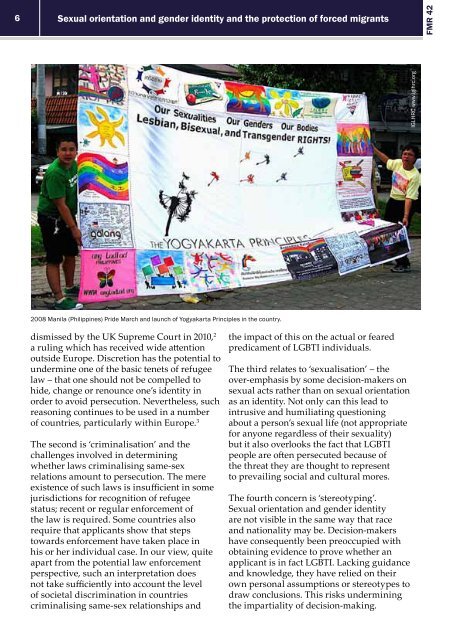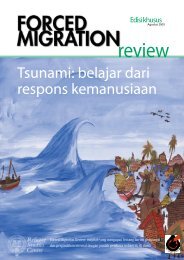FMR 42 full issue pdf - Forced Migration Review
FMR 42 full issue pdf - Forced Migration Review
FMR 42 full issue pdf - Forced Migration Review
You also want an ePaper? Increase the reach of your titles
YUMPU automatically turns print PDFs into web optimized ePapers that Google loves.
6 Sexual orientation and gender identity and the protection of forced migrants<br />
<strong>FMR</strong> <strong>42</strong><br />
IGLHRC www.iglhrc.org<br />
2008 Manila (Philippines) Pride March and launch of Yogyakarta Principles in the country.<br />
dismissed by the UK Supreme Court in 2010, 2<br />
a ruling which has received wide attention<br />
outside Europe. Discretion has the potential to<br />
undermine one of the basic tenets of refugee<br />
law – that one should not be compelled to<br />
hide, change or renounce one’s identity in<br />
order to avoid persecution. Nevertheless, such<br />
reasoning continues to be used in a number<br />
of countries, particularly within Europe. 3<br />
The second is ‘criminalisation’ and the<br />
challenges involved in determining<br />
whether laws criminalising same-sex<br />
relations amount to persecution. The mere<br />
existence of such laws is insufficient in some<br />
jurisdictions for recognition of refugee<br />
status; recent or regular enforcement of<br />
the law is required. Some countries also<br />
require that applicants show that steps<br />
towards enforcement have taken place in<br />
his or her individual case. In our view, quite<br />
apart from the potential law enforcement<br />
perspective, such an interpretation does<br />
not take sufficiently into account the level<br />
of societal discrimination in countries<br />
criminalising same-sex relationships and<br />
the impact of this on the actual or feared<br />
predicament of LGBTI individuals.<br />
The third relates to ‘sexualisation’ – the<br />
over-emphasis by some decision-makers on<br />
sexual acts rather than on sexual orientation<br />
as an identity. Not only can this lead to<br />
intrusive and humiliating questioning<br />
about a person’s sexual life (not appropriate<br />
for anyone regardless of their sexuality)<br />
but it also overlooks the fact that LGBTI<br />
people are often persecuted because of<br />
the threat they are thought to represent<br />
to prevailing social and cultural mores.<br />
The fourth concern is ‘stereotyping’.<br />
Sexual orientation and gender identity<br />
are not visible in the same way that race<br />
and nationality may be. Decision-makers<br />
have consequently been preoccupied with<br />
obtaining evidence to prove whether an<br />
applicant is in fact LGBTI. Lacking guidance<br />
and knowledge, they have relied on their<br />
own personal assumptions or stereotypes to<br />
draw conclusions. This risks undermining<br />
the impartiality of decision-making.




